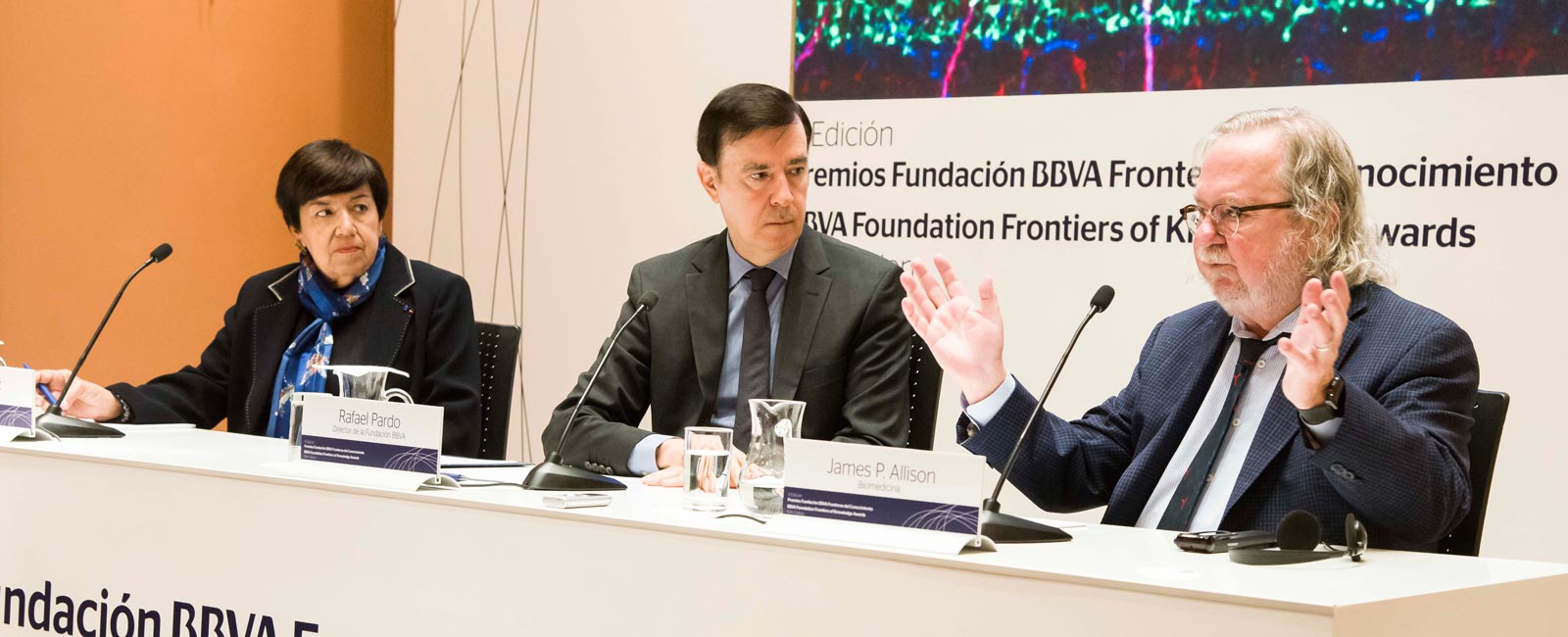
James Allison and Nubia Muñoz stress the importance of combining prevention and new therapies in the battle to defeat cancer
Immunologist James Allison and epidemiologist Nubia Muñoz, winners in the tenth edition of the Frontiers of Knowledge Awards in the Biomedicine and Development Cooperation categories respectively, were equally vocal at this morning’s press conference on the need to combine treatment advances with prevention campaigns, in order to confront cancer. “We now know the cause of many cancers,” Muñoz points out, “but that should not blind us to the fact that smoking is to blame for 30% of all cancers worldwide, and these are cancers that can be avoided. We have to deploy the two weapons at our command: prevention and treatment.”
11 June, 2018
Allison voiced his agreement, while declaring himself upbeat about the results being achieved through combining new therapeutic strategies, like immunotherapy – an area where he is a pioneer – with surgery, radiotherapy and chemotherapy: “There is still a long way to go, and I don’t believe we will ever see a world wholly free of cancer, but we are seeing a lot of progress in some cancers.”
For the Texan scientist, it is not unreasonable to talk about a “cure” in the case of patients with extremely aggressive cancers who have survived without relapse for ten years after a single treatment. This is the kind of success being achieved among metastatic melanoma sufferers by immunotherapeutic drugs developed thanks to Allison’s research, although note that only in around 20% of patients.
James Allison (Texas, United States, 1948) was the first to demonstrate that immunotherapy can be an effective weapon against cancer. This was in the 1990s, by which point few researchers were prepared to bet on the strategy after decades of disappointing results. The first immunotherapy-based anti-cancer drug was approved in 2011 for the metastatic melanoma indication. And immunotherapeutic options are now being rolled out for lung, kidney and bladder cancer and tumors of the neck and head.
For Allison, “the challenge now is to understand why it doesn’t work in every patient,” and to secure the same good results for other cancers. He himself continues to contribute through his basic research, and also through the “Immunotherapy Platform” he leads with his wife and colleague Padmanee Sharma. This platform is involved in about a hundred clinical trials probing the molecular details of patients’ tissues to gauge the effect of immunotherapy.
The harm inflicted by anti-vaccine campaigns
Epidemiologist Nubia Muñoz (Cali, Colombia, 1940) was distinguished for studies involving thousands of women in forty countries which proved that human papillomavirus (HPV) was the “principal and necessary cause” – in Muñoz’s words – of cancer of the uterine cervix, one of the most lethal among women in the developing countries. Her epidemiological work led to the isolation of the seven cancer-producing HPV strains, enabling the development of such supremely effective vaccines that we can even talk – she says – of someday “eradicating” the disease.
“The tragedy is that the vaccines are not getting to the women who need them most,” Muñoz affirms. While screening has ensured a relatively reduced incidence of cervical cancer in the developed world, the picture changes radically in the developing countries, where no such programs exist. And globally, 86% of cases of cancer of the uterine cervix occur in developing countries.
The reason for vaccines not reaching these countries is not just price but also “rumors and false information about their side effects,” spread to damaging effect by social networks. The epidemiologist asked anti-vaccine groups “to return to their senses,” while calling for scientists to go more hands-on in disseminating “reliable information on vaccine safety and benefits” among doctors and the general population. She laments that in her own country, Colombia, a vaccination program that was going really well has had to be called off.
Allison stepped in here to support his colleague, citing the paradox that “in the United States, it is highly educated people that are most opposed to vaccines. They have stopped vaccinating their kids and dangerous diseases are coming back. It is madness.” The more so – he continues – since it has been proved time and again that there is no link between vaccines and autism.
The first HPV vaccine reached the market in 2006. Now there are versions capable of preventing up to 90% of cervical cancers, as well as a substantial percentage of other cancers caused by HPV, including anal and vaginal cancer and certain tumors of the mouth and throat. A recent Cochrane study (May 2018) confirmed the vaccine’s effectiveness, and found no greater risk of serious adverse effects compared to placebo.
This vaccine is already in widespread use in the developed world, and the challenge now is to increase take-up in developing countries by reducing its price and improving the information reaching doctors and the general public. Nubia Muñoz remains directly involved on both fronts. Along with other scientists, she is calling for its inclusion in the male vaccination schedule, since HPV can also cause cancers in men, among them cancer of the penis.

